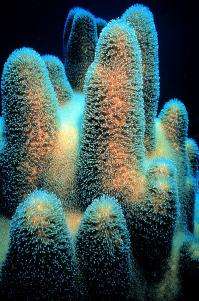Corals have evolved four lifestyles, study says

(Phys.org)—A new study by Simon Fraser University researchers will help scientists better understand and manage coral reef diversity by simplifying how to categorize coral species based on aspects of growth and reproduction.
"We hope that understanding and reducing the complexity of coral life histories can help scientists, managers, and stakeholders make better predictions about how their reefs will fare in the face of climate change, overfishing, and other human disturbances," says Emily Darling, a PhD student in the Earth to Ocean research group with SFU Biological Sciences.
The research study, Evaluating life-history strategies of reef corals from species traits, was recently published in the journal, Ecology Letters. Five people collaborated in the study, including three from SFU: Lorenzo Alvarez-Filip, Isabelle M. Côté, and Darling.
Corals have evolved over millions of years and have a bewildering diversity of sizes, shapes, and colours. Darling and her group compiled existing information for 11 characteristics of corals and found these important reef architects have evolved four similar lifestyles despite their widespread distribution throughout the tropics.
The study identified four lifestyles to characterize the main ecological strategies of the corals:
· Competitive: Some corals are top competitors on reefs and can quickly grow and create canopies that over-top less competitive corals.
· Stress tolerant: Other corals that employ a different strategy and better cope with harsher environments by growing slowly and forming large colonies that can be hundreds of years old.
· Weedy: These pioneer species appear to be adapted for colonizing newly opened space on coral reefs by forming small colonies and investing in larvae through a type of reproduction called brooding.
· Generalist: Some species have a "grab bag" of characteristics and share features in common with all three of the other groups.
"What is also really interesting," says Darling, "is that corals appear to have evolved very similar ways of adapting to their environment as plants, despite being very different organisms."
Corals and plants are physically attached to their habitat and the research may explain why these organisms have evolved similar ways to cope with harsh conditions and periodic disturbances.
"Coral reefs are extremely biologically diverse, and this diversity provides a huge amount of free goods and services to people, not just in tropical areas but around the world," says Darling. "These goods and services include fish and seafood, coastal protection, and a huge tourism industry."
More information: onlinelibrary.wiley.com/doi/10 … 012.01861.x/abstract
Provided by Simon Fraser University



















